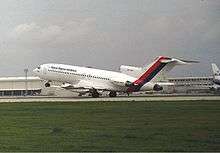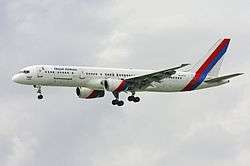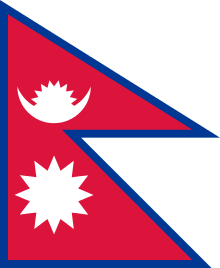Nepal Airlines
 | |||||||
| |||||||
| Founded | July 1, 1958 | ||||||
|---|---|---|---|---|---|---|---|
| Hubs | Tribhuvan International Airport | ||||||
| Fleet size | 10 | ||||||
| Destinations | 8 international, 25 domestic | ||||||
| Parent company | Government of Nepal | ||||||
| Headquarters | Kathmandu | ||||||
| Key people |
| ||||||
| Employees | 2,500 | ||||||
| Website | www.nepalairlines.com.np | ||||||
Nepal Airlines Corporation (Nepali: नेपाल वायुसेवा निगम) is the flag carrier airline of Nepal. Its head office is in the Nepal Airlines Corporation (NAC) Building in Kathmandu,[1][2] and its main base is Tribhuvan International Airport, Kathmandu. The airline was established in July 1958 as Royal Nepal Airlines Corporation (RNAC) to be Nepal's first airline. The airline's first aircraft was a Douglas DC-3, used to serve domestic routes and a handful of destinations in India. The airline acquired its first jet aircraft, Boeing 727s, in 1972. As of May 2017, the airline operates a fleet of ten aircraft.
History
The 1950s and 1960s: early years

The airline was established in July 1958 as Royal Nepal Airlines Corporation with one Douglas DC-3. At the beginning, its services were limited to Simara, Pokhara, such as Patna, Calcutta and Delhi. In 1961, Pilatus Porter STOL aircraft joined the fleet, and in 1963 12-seater Chinese Feng Shou-2 Harvesters were brought into service, opening up the kingdom’s more remote routes.[3]
Nepal's geopolitical situation produced a strange, politically mixed fleet, which was typically financed through aid programs from the country of manufacture. Seven more Douglas DC-3s were added to the fleet between 1959 and 1964. Furthermore, China supplied a couple of Feng Shou-2 aircraft which did not enter scheduled service. Bell Helicopters leased from Singapore were also used for charters. Two Russian Mi-4 helicopters also flew on scheduled routes to remote points. The route network was expanded internally and externally, soon reaching Dhaka in what was then East Pakistan.[4]
In 1966, a turboprop Fokker F27 was added to the airline’s fleet.
The 1970s and 1980s: the jet age and economic boom
In 1970, NAC acquired its first Hawker Siddley HS-748 followed by Twin Otters in 1971 and Boeing 727s in 1972. Two Boeing 757s gradually replaced the airline’s Boeing 727s in 1987.[3]

Nepal had 181,000 tourist visitors in 1985, of which 80 percent arrived by air. Royal Nepal Airlines carried 38 percent of these tourist passengers, but that number was down from the company's peak market share of 50 percent in 1979. Indian Airlines Corporation was NAC's main competitor, but newer entrants in the business were also competing with NAC for market share. These companies included Singapore Airlines and Lufthansa, which started direct Kathmandu-Frankfurt service in cooperation with NAC in October 1987 and now, other airlines are also wanting to do so.
At the time, Royal Nepal Airlines' network connected 38 domestic and 10 international destinations. NAC was flying directly from Nepal to Hong Kong (home to many Gurkhas employed by the British Army) by 1988 using a Boeing 757. In April 1988, NAC and the Civil Aviation Administration of China cooperated to provide scheduled service between Kathmandu and Lhasa in the autonomous province of Tibet.[4]
RNAC reported revenues of $54.3 million in 1988—89, producing an operating profit of $17 million. With a workforce of 2,200, NAC had become the country's largest employer and largest earner of foreign currency, bringing in roughly $15 million a year from abroad. Seventy-five percent of the company's passengers were foreign tourists. London, Dubai, Dhaka, Karachi, and Bombay were added to the route network during the 1980s.[4]
The 1990s and 2000s: corruption
The domestic air market of the country was liberalized in 1992, and new competitors emerged: Necon Air, Nepal Airways, Everest Air, Buddha Air, Yeti Airlines, and Sita Air. Nepal Airlines had its last Boeing 727 flight in 1992. By 1997, these four competitors accounted for 70 percent of Nepal's domestic air traffic.[5]
Adding to the airline's struggles as the millennium approached, were allegations of corruption which periodically surfaced. One case involved Dinesh Dhamija, who later founded the Ebookers Internet travel site. Dhamija had been accused of receiving his post as director of RNAC's European operations in the early 1990s on account of cronyism with Prime Minister Girija Prasad Koirala. Dhamija won a substantial settlement with the airline after a bitter court battle over these charges.[4]
In December 2000, a large scandal revolved around the lease of a Boeing 767 aircraft from Austria's Lauda Air, which entered service in over protests from employees and government officials. The latter claimed the deal was unnecessary, since NAC was not getting enough usage from its two existing Boeing 757s; further, the actual cost per flight hour of the Lauda jet ended up being $5,000 ($1,150 above the cost specified in the contract). RNAC chairman Haribhakta Shrestha was suspended during an investigation, along with other NAC executives; Nepal's tourism and civil aviation minister Tarani Dutt Chataut resigned soon after.[4]
In 2004, it was reported that the Government of Nepal had decided to sell off 49% of its stake in Nepal Airlines, to the private sector, and hand over management control, whilst retaining a 51% share. This would provide the investment to get the airline out of significant debt.[6]
The former chairman of Nepal Airlines, Ramagya Chaturvedi, was jailed for corruption in February 2005.[7]

In September 2007, the airline confirmed that it had sacrificed two goats to appease a Hindu god following technical problems with one of its aircraft. Nepal Airlines said the animals were slaughtered in front of the plane, a Boeing 757, at Tribhuvan International Airport. The offering was made to Akash Bhairab, the Hindu god of sky protection, whose symbol is seen on the company’s aircraft. The airline said that after Sunday’s ceremony, the plane successfully completed a flight to Hong Kong. Raju KC, an airline official, was quoted as saying: “The snag in the plane has now been fixed and the aircraft has resumed its flights.” The company did not say what the problem was, but reports in local media had blamed an electrical fault.[8]
In 2009, at the Dubai Airshow, Nepal Airlines signed a memorandum of understanding to acquire two Airbus A320-200. The A320s will operate flights to the Middle East and Southeast Asia.[9]
On 30 April 2015, Nepal Airlines received its second Airbus A320, Lumbini. The aircraft was filled with 5 tonnes of aid material to be flown from the Airbus factory in Hamburg, to Nepal on delivery of the aircraft. The aid material will be used in the relief effort for the April 2015 Nepal earthquake.
In 2015, Nepal Airlines flew 253,658 travellers, up 22.87 percent compared to the previous year of 206,430 passengers.[10] Similarly, it flew 42,535 domestic air passengers in 2015, increase of 21.60% compared to previous year.[11]
In 2016, the airline's one of the aging Boeing 757-200 (Registration 9N-ACA) retired after three decades of service because of the non-profitable operation with high maintenance cost. The airline currently operates international flights with its two Airbus A320-200s and one Boeing 757-200M.
Nepal Airlines will have two Airbus A330-200 added to its fleet by the beginning of 2018, sourced from an order by Hi Fly of Portugal and AAR Corporation. The airline plans to expand its international destinations by operating the newly added wide-body jets to cities like Seoul Incheon, Tokyo and Sydney.
Destinations
Nepal airlines flies to 8 international destinations from its base Tribhuvan International Airport in Kathmandu. Nepal Airlines flies to 25 domestic destinations.
Nepal Airlines is included in the list of air carriers banned in the EU, as of December 2015.[12]
Codeshare Agreements
Fleet




The Nepal Airlines fleet includes the following aircraft (as of January 2017):[14]
| Aircraft | In Service | Orders | Passengers | Note | ||
|---|---|---|---|---|---|---|
| C | Y | Total | ||||
| Airbus A320-200 | 2 | 2 | 8 | 150 | 158 | |
| Airbus A330-200 | — | 2 | 18 | 256 | 274 | Orders through Hi Fly[15] |
| Boeing 757-200M | 1 | — | 16 | 174 | 190 | |
| Xian MA-60 | 2 | — | — | 56 | 56 | [16] |
| de Havilland Canada DHC-6 Twin Otter | 3 | — | — | 19 | 19 | |
| Harbin Y-12 | 2 | 2[17] | — | 19 | 19 | |
| Total | 10 | 6 | ||||
Historical fleet
| Aircraft | In service | Exit from service |
|---|---|---|
| Boeing 757-200 | 1987 | 2017 |
| Airbus A310 | 1993 | 1996 |
| Boeing 727-200 | 1972 | 1993 |
| Boeing 767-300 | 2000 | 2001 |
| Douglas DC-3 | 1958 | 1973 |
| Fokker F27 Friendship | 1966 | 1970 |
| Fong Shou-2 Harvester | 1963 | 1965 |
| Hawker Siddley HS-748 | 1970 | 1996 |
| Pilatus Porter | 1961 | 1998 |
Incidents and accidents
- 5 November 1960 – NAC Douglas C-47A-80-DL (9N-AAD) crashed on take-off at Bhairawa Airport and caught fire. All 4 crew members were killed. There were no passengers on board.[19]
- 1 August 1962 – RNA Douglas C-47A-DL (9N-AAH) en route from Kathmandu-Gaucher Airport to New Delhi, radio contact was lost and the aircraft crashed near Tulachan Dhuri. The wreckage was found on 9 August 1962 on a mountain top at 11,200 feet. All four crew and six passengers were killed.[19]
- 12 July 1969 – NAC Douglas DC-3D (9N-AAP) collided with a tree while flying over a cloud covered ridge at 7,300 feet at Hetauda, Nepal. All four crew and 31 passengers were killed.[19]
- 25 January 1970 – NAC Fokker F27-200 (9N-AAR) after a flight from Kathmandu, was caught in severe thunderstorms with turbulence and down draughts on final approach to Delhi (Palam Airport). The pilot couldn't control the aircraft and crashed short of the runway. Of the five crew and 18 passengers only one crew member was killed.[19]
- 10 June 1973 – RNA 9N-ABB on a flight from Biratnagar to Kathmandu, was taken over by three hijackers of Nepali Congress party who demanded money and escaped after landing in Bihar, India. None of the three crew and 18 passengers were injured.[20]
- 15 October 1973 – NAC De Havilland Canada DHC-6 Twin Otter 300 (9N-ABG) was damaged beyond repair at Lukla Airport; the three crew and three passengers were unhurt.[19]
- 22 December 1984 – NAC De Havilland Canada DHC-6 Twin Otter 300 (9N-ABH) crashed off course near Bhojpur, Nepal. Bad weather and pilot error could have been the cause. All three crew were killed as well as 12 of the 20 passengers.[19]
- 9 June 1991 – NAC De Havilland Canada DHC-6 Twin Otter 300 (9N-ABA), after a flight from Kathmandu, crashed on landing at Lukla Airport following an unstabilized approach in bad weather. All three crew and 14 passengers were killed.[19]
- 5 July 1992 – NAC De Havilland Canada DHC-6 Twin Otter 300 (9N-ABB), lost directional control on takeoff from Jumla Airport on a flight to Surkhet. The aircraft ran off the runway and struck the airport perimeter fence. None of the three crew were injured and there were no passengers on board.[19]
- 17 January 1995 – NAC De Havilland Canada DHC-6 Twin Otter 300 (9N-ABI), flight RA133 from Kathmandu to Rumjatar, had problems getting airborne at Tribhuvan International Airport, struck the airfield perimeter fence and plunged into fields. Of three crew and 21 passengers, one crew member and one passenger were killed.[19]
- 25 April 1996 – NAC BAe 748 Series 2B (9N-ABR) overran the runway at Meghauli Airport, after a flight from Kathmandu, when landing in rain on the grass airstrip. The aircraft ran across some ditches, causing the nosegear to collapse. None of the 4 crew and 27 passengers were injured.[19]
- 27 July 2000 – NAC De Havilland Canada DHC-6 Twin Otter 300 (9N-ABP), on a flight from Bajhang to Dhangadhi, collided with trees on the 4,300 feet Jarayakhali hill on the Churia mountain range before catching fire. All 3 crew and 22 passengers were killed.[19]
- 19 April 2010 – A Nepal Airlines De Havilland Canada DHC-6 Twin Otter 300 (9N-ABX) on a flight from Kathmandu (KTM) to Phaplu Airport (PPL) (with Kangel Danda as designated alternate airport). The aircraft was unable to land at Phaplu due to poor weather. The crew decided to divert to their alternate airport at Kangel Danda. The airplane touched down on its nose gear first and suffered some minor damage to the nose section.[19]
- 16 May 2013 – A Nepal Airlines De Havilland Canada DHC-6 Twin Otter 300 (9N-ABO) on flight RA-555 from Pokhara (PKR) to Jomsom (JMO) veered left off of the runway after touching down at Jomsom and went down the slope to the Kaligandaki river. The aircraft stopped at the bank of the river, with the left wing in the water. Three crew and four passengers received serious injuries, and 15 passengers received minor or no injuries. The aircraft was damaged beyond repair.[21]
- 16 February 2014 – A Nepal Airlines De Havilland Canada DHC-6 Twin Otter (9N-ABB) on flight 183 went missing en route to Jumla carrying 18 people aboard. It was later confirmed that the plane had crashed in Argakhachi.[22]
- 17 October 2015- The fuselage of a Nepal Airlines Airbus A320 registration 9N-AKX was damaged while on the ground, after being hit by a catering truck in Hong Kong International Airport. Flight 410 from Hong Kong to Kathmandu was cancelled, and the aircraft was grounded.
See also
References
- ↑ "Contact Information."Nepal Airlines. Retrieved on 31 December 2011. "Head Office Contact Information RNAC Building, Kantipath Kathmandu, Nepal"
- ↑ "World Airline Directory." Flight International. 23–29 March 1994. 114. "Head office: PO Box 401, NAC Building, Kantipath, Kathmandu 711000, Nepal."
- 1 2 Brief History of Nepal Airlines retrieved 28 August 2010
- 1 2 3 4 5 "History of Nepal Airline Corporation – FundingUniverse". Fundinguniverse.com. Retrieved 2014-02-16.
- ↑ R.E.G. Davies, Airlines of Asia Since 1920
- ↑ Tribune India 12 November 2004
- ↑ The Himalayan Times 9 February 2005
- ↑ "BBC NEWS - South Asia - Goats sacrificed to fix Nepal jet". Retrieved 24 April 2015.
- ↑ ATW Daily News Dubai Airshow News 18 November 2009
- ↑ Prasai, Sangam (4 April 2016). "Int'l passenger traffic drops for first time in 13 years http://bit.ly/1qqMyqD". The Kathmandu Post. Retrieved 15 April 2016. External link in
|title=(help) - ↑ "Air passenger movement falls for 4th straight year". The Kathmandu Post. 9 April 2016. Retrieved 15 April 2016.
- ↑ "EU continues ban on Nepali airlines". The Himalayan Times. 12 December 2015. Retrieved 11 April 2016.
- ↑ "NAC, Druk Air signs codesharing pact". Retrieved 24 April 2015.
- ↑ "Aircraft and Fleet Lists - ch-aviation.com". ch-aviation. Retrieved 24 April 2015.
- ↑ "NAC orders 2 Airbus planes via Hi Fly". kathmandupost.com. Retrieved 22 June 2017.
- ↑ http://aviationnepal.com/nepal-airline-9n-akr-new-aircraft-landed-tribhuvan-international-airport-photo-feature/
- ↑ "Nepal Airlines Corporation, Chinese company sign six aircraft deal, Aircraft in Nepal, Nepal Aircraft, Local Airlines, Nepal Airlines - Nepal Tours Destination". Retrieved 24 April 2015.
- ↑ "Royal Nepal Airlines Fleet Details and History". planespotters.net/. Retrieved 11 April 2016.
- 1 2 3 4 5 6 7 8 9 10 11 12 "Aviation Safety Network". Retrieved 18 November 2006.
- ↑ "Nepal Magazine". Retrieved 18 November 2006.
- ↑ "Accident: Nepal DHC6 at Jomsom on May 16th 2013, runway excursion". AVHerald. 16 May 2013. Retrieved 16 May 2013.
- ↑ "Crash: Nepal DHC6 near Khidim on Feb 16th 2014, aircraft impacted terrain". Avherald.com. Retrieved 2014-02-16.
External links
| Wikimedia Commons has media related to Nepal Airlines. |
- Official website
- Template:Flight Ticket Booking website
